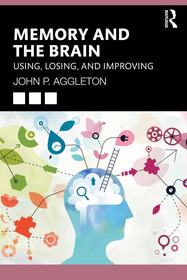
Memory and the Brain
Using, Losing, and Improving
-
10% KEDVEZMÉNY?
- A kedvezmény csak az 'Értesítés a kedvenc témákról' hírlevelünk címzettjeinek rendeléseire érvényes.
- Kiadói listaár GBP 24.99
-
11 938 Ft (11 370 Ft + 5% áfa)
Az ár azért becsült, mert a rendelés pillanatában nem lehet pontosan tudni, hogy a beérkezéskor milyen lesz a forint árfolyama az adott termék eredeti devizájához képest. Ha a forint romlana, kissé többet, ha javulna, kissé kevesebbet kell majd fizetnie.
- Kedvezmény(ek) 10% (cc. 1 194 Ft off)
- Kedvezményes ár 10 745 Ft (10 233 Ft + 5% áfa)
Iratkozzon fel most és részesüljön kedvezőbb árainkból!
Feliratkozom
11 938 Ft

Beszerezhetőség
Becsült beszerzési idő: A Prosperónál jelenleg nincsen raktáron, de a kiadónál igen. Beszerzés kb. 3-5 hét..
A Prosperónál jelenleg nincsen raktáron.
Why don't you give exact delivery time?
A beszerzés időigényét az eddigi tapasztalatokra alapozva adjuk meg. Azért becsült, mert a terméket külföldről hozzuk be, így a kiadó kiszolgálásának pillanatnyi gyorsaságától is függ. A megadottnál gyorsabb és lassabb szállítás is elképzelhető, de mindent megteszünk, hogy Ön a lehető leghamarabb jusson hozzá a termékhez.
A termék adatai:
- Kiadás sorszáma 1
- Kiadó Routledge
- Megjelenés dátuma 2024. december 16.
- ISBN 9781032826592
- Kötéstípus Puhakötés
- Terjedelem278 oldal
- Méret 246x174 mm
- Súly 560 g
- Nyelv angol
- Illusztrációk 93 Illustrations, black & white; 93 Halftones, black & white 721
Kategóriák
Rövid leírás:
Memory and the Brain explores the fascinating psychology and neuroscience of human memory. Written by a World expert in the field, John P. Aggleton, this book covers learning and memory from the very beginning of life to its end, with an emphasis on real-world applications throughout.
TöbbHosszú leírás:
Memory and the Brain explores the fascinating psychology and neuroscience of human memory.
Written by a world expert in the field, John P. Aggleton, this book covers learning and memory from the very beginning of life to its end, with an emphasis on real-world applications throughout. Aggleton begins by considering the fallibility of long-term memory and explores the many reasons why we forget. He goes on to contrast this with superior memory and examines what, if anything, is special about individuals with remarkable memory powers, and how might we improve our own memory. The significance of sleep, our ability to ‘remember’ the future, the various brief memory stores, and the multiple forms of amnesia are also covered, as well as the most common forms of dementia – including Alzheimer's disease. The book concludes with an Alphabet of Memory Curiosities, which showcases a diverse range of topics: from aphantasia to zebrafish, stopping off at topics such as Jennifer Aniston neurons, bilingualism, and neuromyths in education.
Drawing on classic studies alongside many discoveries from contemporary research, this book is written for anyone curious about how our memory works and will appeal to students and general readers alike.
TöbbTartalomjegyzék:
1. Memories make us who we are. 2. From before birth to adolescence. 3. Adulthood, aging, and superaging. 4. How accurate and durable are our adult memories?. 5. Comprehension, encoding, and recall. 6. Why do we forget?. 7.Context and memory. 8. Superior memory in individuals: Mnemonists, memory champions, and savants. 9. Superior memory for all: Mnemonics, imagery, and skilled performance. 10. ‘Smart drugs’, supplements, and self-brain stimulation. 11. The value of sleep. 12. Imagination, future memory, and prospective memory. 13. Recognition memory and illusions of familiarity. 14. Brief memory stores: Sensory memory. 15. Brief memory stores: Short-term memory. 16. Brief memory stores: Working memory. 17. Losing memory: Real amnesias and simulated amnesias. 18. Losing memory: Alzheimer’s disease and other dementias. 19. An alphabet of memory curiosities. A)Aphantasia: People who lack imagery. B)Bilingualism – does it aid memory?. C)Computerised brain training – does it work?. D)Duplicates, delusions, and familiarity disorders. E)Exercise – is it worth it?. F)Food preferences and learnt taste aversions. G)The ‘Generation Effect’, the Aha! moment, and memory. H)Hypnosis, memory, and the law. I)Illusions of learning and illuminating text. J)Jennifer Aniston neurons. K)Knowing your own memory – metamemory and metacognition. L)L learners: Spaced versus massed practice. M)Mozart, music, and memory. N)Neuromyths in education – eight seductive ideas. O)Openness and the three Rs (Reproducibility, Robustness, and Replicability). P)Parrot learning – learning by rote. Q)Quite interesting and quite curious. R)Return trip effect. S) Surprise and memory. T) Truth serums. U) Unconscious learning – can you learn when anaesthetised?. V) Vegetative brain state, awareness, and new learning. W) White matter learning. XX XY) Sex differences and memory. Y) Y is money called money? The worship of memory. Z) Being at the end of the alphabet – good or bad? (not to forget zebrafish). 20. Naming the Brain. 21. Twenty (plus one) ways to improve your memory. References.
Több



